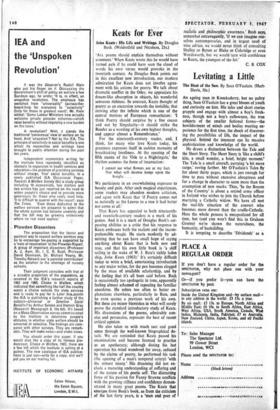Keats for Ever
'ALL poems should explain themselves without comment.' When Keats wrote this he would have turned pale if he could have seen the cloud of words his own verses would provoke in the twentieth century. As Douglas Bush points out in this excellent new introduction, our modern admiration for Keats does not involve agree- ment with his axioms for poetry. We talk about dramatic conflict in the Odes; we appreciate his dream-like absorption in objects, his wonderful sensuous richness. In contrast, Keats thought of poetry as an excursion towards the invisible, that striving after the infinite which is one of the central motives of European romanticism: 'I think Poetry should surprise by a fine excess and not by Singularity—it should strike the Reader as a wording of his own highest thoughts, and appear almost a Remembrance.'
For the nineteenth-century reader, and, I think, for many who love Keats today, his greatness expresses itself in sudden moments of breathtaking loveliness. At the opening of the fifth stanza of the 'Ode to a Nightingale,' the rhythm assumes the force of incantation:
I cannot see what flowers are at my feet, Nor what soft incense hangs upon the boughs . . .
We participate in an overwhelming exposure to beauty and pain. After such magical experiences, some readers may abandon modern criticism, and agree with Keats that 'if Poetry comes not as naturally as the Leaves to a tree it had better not come at all.'
That Keats has appealed to both nineteenth- and twentieth-century readers is a mark of his genius. And it is a mark of Douglas Bush's sur- passing abilities as a critic that his response to Keats embraces both the realism and the incom- prehensible magic. He starts modestly by ad- mitting that he can have small hope of saying anything about Keats that is both new and true, and that his own little book is 'a skiff sailing in the wake of W. J. Bate's richly laden ship, John Keats (1963).' It's certainly difficult today to write a brief, entertaining introduction to any major writer, for the pen becomes clogged by the mass of available scholarship, and by the feeling that it's all been said before. Bush is occasionally too apologetic in tone, apparently feeling almost ashamed of repeating the familiar anecdotes. He refers too often to better ex- planations elsewhere, particularly to Bate, and he even quotes a previous work of his own. But these are minor blemishes in what will surely prove the standard introductory study of Keats. His discussions of the poems, admirably con- cise and persuasive, represent the best of recent critical opinion.
He also takes us with much tact and good sense through the well-known biographical de- tails. We are reminded that Keats passed his examinations and became licensed to practise as an apothecary; although during his last operation his mind wandered far away, seduced by the claims of poetry, he performed his task (the opening of a man's temporal artery) 'with the utmost nicety.' His dreaming did not ex- clude a maturing understanding of suffering and of the nature of his poetic self. The distracting force of his passion for Fanny Brawne conflicts with the growing stillness and confidence demon- strated in many great poems. The Keats that emerges from Bush's book, as from the criticism of the last forty years, is a 'man and poet of realistic and philosophic awareness.' Bush says, somewhat extravagantly, 'if we can imagine our- selves contemporaries, and in urgent need of wise advice, we would never think of consulting Shelley or Byron or Blake or Coleridge or even Wordsworth, but we would turn with confidence to Keats, the youngest of the lot.'
C. B. COX






























 Previous page
Previous page